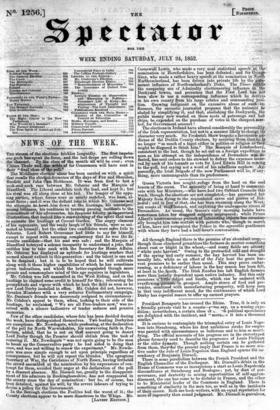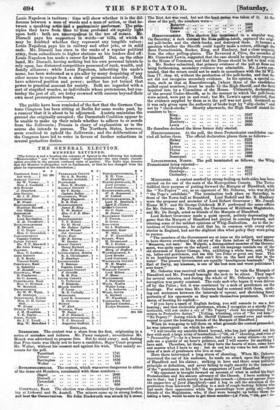- President Bonaparte has- crossed the Rhine. True, it is
only on a friendly private visit to a cousin7rme say, an-a wooing expe- dition; nevertheless, a _certain class ot political speculators are delighted with the incident, and " morai,....e it into a thousand similes. It is curious to contemplate the triumphal entry of Louis Napo- leon into Strasbourg, where his first -ambitious stroke for empire was parried with eirciimstalices so ludicrous and to him so morti- fying. The official accounts of his progress are in the stereotyped phrase formerly used to describe' the progresses of Louis Philippe or the elder dynasty. Though nothing certain can . be gathered from them, thee/or the present imply that France is no more res- tive under the rule of Louis Napoleon than England spurns the as-
cendancy of Benjamin Diaraeli.•,. • • •
There is some parallelism between the French President and the English Chancellor. of the.Exohequer. Mr. Disraeli's debut in the House of Commons was as inauspicious a start as-Lonis Napoleon's discomfitures at Strasbourg and Boulogne ; yet, by dint of per- severance, and dexterity•in seizing opportunities of self-aggran- dizement, the one-has-come to be -dictator in France, and the other to be Ministerial- leader in the Commons in England. There is something of similarity in the men too, as well as in the incidents of their career. Both are book-writers, with an equal reputation for more a ingenuity than sound judgment. Mr. Disraeli is garrulous,
Louis Napoleon is taciturn : time will show whether it is the dif- ference between a man of words and a man of action, or that be- tween a speaking actor and a pantomimic performer. The ciples they have froia time to time professed sit equally upon both : both are. unscrupulous in the use of means. Disraeli pays his supporters in words—or bills, of which it may be doubted whether they represent any tangible values : Louis Napoleon pays his in railway and other jobs, or in solid cash. Mr. Diiraeli has risen in the ranks of a regular political army, from subordinate to higher stations as his leaders died off: Louis Napoleon has made a career for himself. But, on the other hand, Mr. Disraeli, having nothing but his own personal talents to rely upon, has distanced competitors possessed of rank, wealth, and family alliances ; while Louis Napoleon, inheriting his uncle's name, has been welcomed as a pis-aller by many despairing of any other means to escape from a state of permanent anarchy. Both have achieved position and power ; neither has yet turned that power to practical account for society. Both are regarded with a sort of stupified wonder, as individuals whose pretensions, but yes- terday the jest of all, are today crowned with success beyond their own most presumptuous hopes.



























